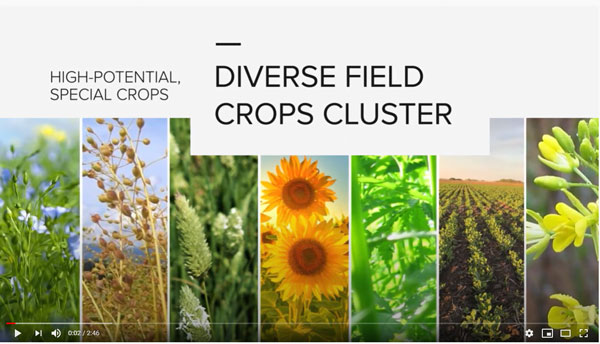Saskatoon, SK: The Diverse Field Crops Cluster (DFCC) has produced short informational videos to explain the research being conducted to improve seven high-potential, special crops grown on the Canadian Prairies: camelina, canary seed, flax, hemp, mustard, quinoa, and sunflower.
DFCC is an agri-science cluster led by Ag-West Bio, with funding from Agriculture and Agri-Food Canada’s Canadian Agricultural Partnership (CAP) program and industry partners. The five-year project is now entering its third year.
Carol Ann Patterson, DFCC Project Manager, says “The videos give a quick summary of the benefits of these crops to consumers and producers, and explain how the research can help these valuable crops gain a more significant place in our agri-food system.”
DFCC will benefit farmers by increasing the variety of crops that Canadian farmers grow. Diversifying the cropping mix will help to extend rotations, break disease and pest cycles, and insulate producers from the volatility of commodity price cycles.
DFCC’s projects include 15 research activities focused on variety development, agronomics and production and value-added initiatives. The research is a collaborative effort between numerous organizations across Canada.
The crops under the DFCC umbrella are represented by Canadian Hemp Trade Alliance, Canary Seed Development Commission of Saskatchewan, Mustard 21 Canada Inc., Northern Quinoa Production Ltd. (NorQuin) National Sunflower Association of Canada, Saskatchewan Flax Development Commission, and Smart Earth Camelina Corp.
Visit Diverse Field Crops Cluster website for more information about the research cluster.
Click the playlist button on the upper right corner to watch all the videos:
